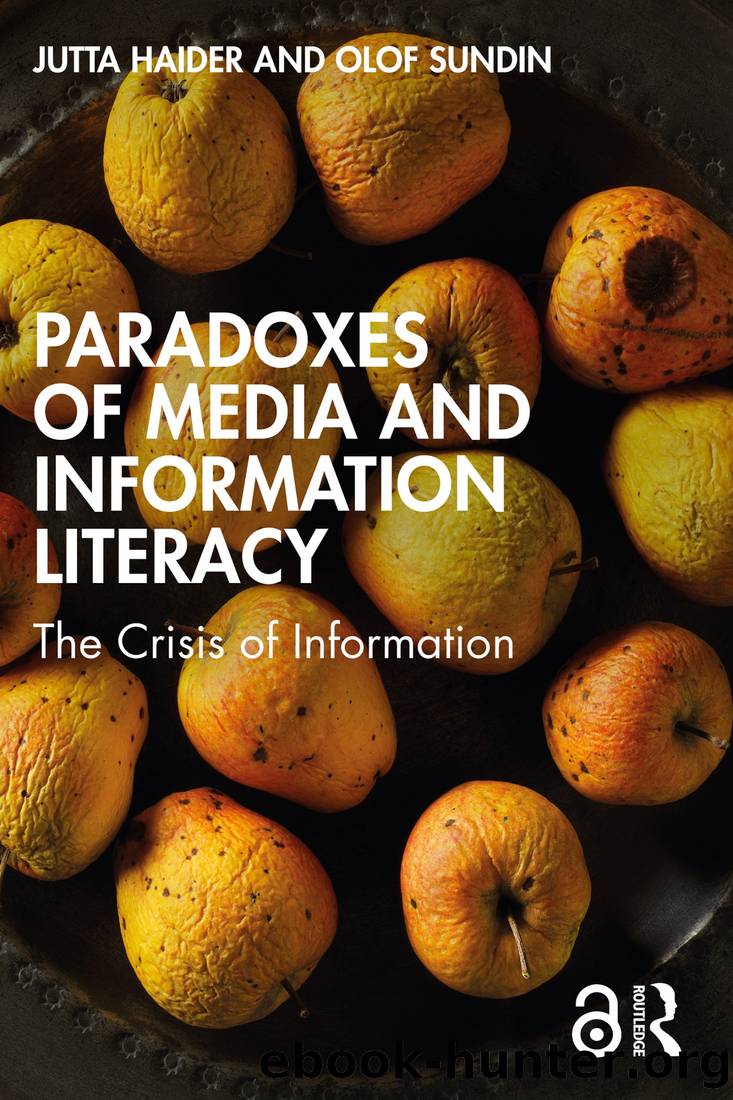Paradoxes of Media and Information Literacy by Jutta Haider & Olof Sundin

Author:Jutta Haider & Olof Sundin [Haider, Jutta & Sundin, Olof]
Language: eng
Format: epub
ISBN: 9781000590289
Publisher: TaylorFrancis
Published: 2022-03-24T00:00:00+00:00
Here, a young person recounts an intervention where the platform service, in this case YouTube, is provided with user data, in the form of engagements, with the expressed aim of shaping future recommendations of videos. This direct and deliberate intervention then enables YouTube to predict different content to be relevant and populate the feed (or recommended videos) with.
The same person concludes their account by explaining: âSo that is a way in which I try to change that algorithmâ. In a strict sense, this is not what they do. They do not change the algorithm. On the contrary, they affirm it, play by its rules. They might even contribute to improving it (whatever that means). Nevertheless, it is an interesting statement, because it provides a glimpse into peopleâs algorithm awareness (Gran et al., 2021), and more precisely, into how they imagine algorithms to operate. We already encountered some of these algorithmic imaginaries in Chapter 2. These are, in the words of media researcher Taina Bucher, âthe way in which people imagine, perceive and experience algorithms and what these imaginations make possibleâ (Bucher, 2017, p. 31). How people conceptualise invisible algorithms and algorithmic systems, how they make sense of their effects, and how they consider themselves and their actions in relation to them, cannot be dealt with in terms of correct or incorrect. Rather, the different ways of imagining algorithms and algorithmic systems have implications for how they are used, interpreted, and understood.
In fact, participants in our pair interviews describe enacting algorithmic imaginaries in their depictions of how they relate to the algorithmic systems in question, mainstream social media platforms, and their predictive decision-making. Unavoidably, the meaning attributed to the content encountered, and also to the content that is deterred, implicates these conceptualisations. It could be argued that infrastructural meaning-making occurs by way of algorithmic imaginaries and increasingly involves variously layered anticipatory strategies. Consider the following account conveyed by another participant in one of our pair interviews. This time the information system in question is Google Search:
For example, if Iâm going to have a discussion with a friend, about something, then I google what I want to google, for example, âcoffee causes cancerâ. Then I google âcoffee causes cancerâ and I get a lot of articles. Then he googles âcoffee is good for your healthâ, and then he also gets a lot of articles.
Download
This site does not store any files on its server. We only index and link to content provided by other sites. Please contact the content providers to delete copyright contents if any and email us, we'll remove relevant links or contents immediately.
| Booksellers & Bookselling | General |
| History of Books |
4 3 2 1: A Novel by Paul Auster(12354)
The handmaid's tale by Margaret Atwood(7729)
Giovanni's Room by James Baldwin(7301)
Asking the Right Questions: A Guide to Critical Thinking by M. Neil Browne & Stuart M. Keeley(5741)
Big Magic: Creative Living Beyond Fear by Elizabeth Gilbert(5726)
Ego Is the Enemy by Ryan Holiday(5392)
The Body: A Guide for Occupants by Bill Bryson(5065)
On Writing A Memoir of the Craft by Stephen King(4920)
Ken Follett - World without end by Ken Follett(4705)
Adulting by Kelly Williams Brown(4552)
Bluets by Maggie Nelson(4534)
Eat That Frog! by Brian Tracy(4499)
Guilty Pleasures by Laurell K Hamilton(4422)
The Poetry of Pablo Neruda by Pablo Neruda(4079)
Alive: The Story of the Andes Survivors by Piers Paul Read(4009)
White Noise - A Novel by Don DeLillo(3990)
Fingerprints of the Gods by Graham Hancock(3979)
The Book of Joy by Dalai Lama(3960)
The Bookshop by Penelope Fitzgerald(3827)
